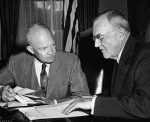
“It is now nearly a year since the Eisenhower administration took office… Tonight I should like to present an overall view of those policies which relate to our security.
First of all, let us recognise that many of our preceding foreign policies were good. Aid to Greece and Turkey had checked the Communist drive to the Mediterranean. The European Recovery Program [Marshall Plan] had helped the peoples of Western Europe to pull out of the postwar morass. The Western powers were steadfast in Berlin and overcame the blockade with their airlift. As a loyal member of the United Nations, we reacted with force to repel the Communist attack in Korea…
These were the acts of a nation which saw the danger of Soviet communism; which realised that its own safety was tied up with that of others; which was capable of responding boldly and promptly to emergencies… But we need to recall that what we did was, in the main, emergency action, imposed on us by our enemies… Emergency measures are costly; they are superficial; they imply that the enemy has the initiative. They cannot be depended on to serve our long-time interests.
This ‘long-time’ factor is of critical importance. The Soviet Communists are planning for what they call ‘an entire historical era’ – and we should do the same. They seek, through many types of manoeuvres, gradually to divide and weaken the free nations, by over-extending them in efforts which, as Lenin put it, are ‘beyond their strength, so that they come to practical bankruptcy’. Then, said Lenin, ‘our victory is assured’. Then, said Stalin, will be ‘the moment for the decisive blow’…
When the Eisenhower administration applied this test, we felt that some transformations were needed. It is not sound military strategy to commit US land forces to Asia to a degree that leaves us no strategic reserves. It is not sound economics or good foreign policy to support permanently other countries; in the long run, that creates as much ill will as goodwill. Also, it is not sound to become permanently committed to military expenditures so vast that they lead to “practical bankruptcy”…
We need allies and collective security. Our purpose is to make these relations more effective, less costly. This can be done by placing more reliance on deterrent power and less dependence on local defensive power. This is accepted practice so far as local communities are concerned. We keep locks on our doors but we do not have an armed guard in every home. We rely principally on a community security system so well equipped to punish any who break in and steal that, in fact, would-be aggressors are generally deterred. That is the modern way of getting maximum protection at a bearable cost.
What the Eisenhower administration seeks is a similar international security system. We want, for ourselves and the other free nations, a maximum deterrent at a bearable cost… Local defences must be reinforced by the further deterrent of massive retaliatory power. A potential aggressor must know that he cannot always prescribe battle conditions that suit him…
The President and his advisers, as represented by the National Security Council, had to make some basic policy decisions. This has been done. The basic decision was to depend primarily upon a great capacity to retaliate, instantly, by means and at places of our choosing. Now the Department of Defence and the Joint Chiefs of Staff can shape our military establishment to fit our policy, instead of having to try to be ready to meet the enemy’s many choices…”
